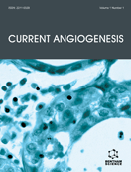Abstract
Vascular endothelial growth factor-A (VEGFA) and placental growth factor (PlGF) can mediate cancer progression and anticancer treatment failure. We therefore analyzed (sub)cellular patterns of VEGFA and PlGF expression, and mean vessel density (MVD) in primary rectal tumor samples of stage IV patients, who could benefit from improved therapies. VEGFA, PlGF and MVD were measured immunohistochemically in paraffin-embedded rectal tumor tissue before and after pelvic radiotherapy and systemic neoadjuvant treatment with bevacizumab, capecitabine, and oxaliplatin. The relation between baseline expression of VEGFA and PlGF, and MVD and pathologic response to treatment was also analyzed. At diagnosis, 91% of the 46 tumors expressed VEGFA in the cytoplasm and 50% in the nucleus of tumor cells. PlGF was expressed by 74% in the tumor cell's cytoplasm. There were no differences in VEGFA expression and MVD at baseline between the nine patients with pathologic complete response (pCR) and the 30 patients with residual tumor after treatment. All patients with pCR expressed PlGF in tumor cells at baseline, as did 19 of the 30 patients with residual tumor. After treatment, nuclear VEGFA expression in tumor cells and MVD were lower in residual tumors as compared to the initial tumor [15% vs. 56%, P = 0.024, and 10.3 (±4.2) vs.16.4 (±6.0), P < 0.0001]. PlGF expression in residual cancer did not significantly differ from the paired pre-treatment values. These data indicate the relevance of VEGFA and PlGF to rectal tumor biology, and might suggest PlGF blockade as being of interest to test in metastatic rectal cancer.
Keywords: Bevacizumab, chemotherapy, mean vessel density (MVD), placental growth factor (PlGF), radiotherapy, (metastatic) rectal cancer, tumor microenvironment, vascular endothelial growth factor-A (VEGFA).
Graphical Abstract
 13
13

